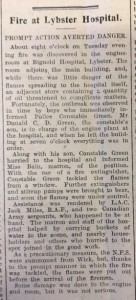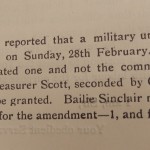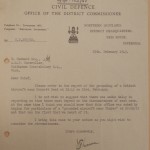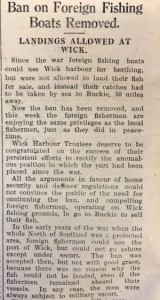On 26 February Rommel left the Mareth Line, a defensive position in the Tunisian desert, and continued his retreat northward, pursued by the Eighth Army. On 28 February the first American Victory Ship was launched, a cargo ship built to replace merchant shipping losses from U-boats. Also on the 28th, a raid by Allied commandos successfully damaged the heavy water plant at Vemork in Norway, which could have been used in the production of German atomic weapons.
In Caithness, the John O’Groat Journal this week reported a potentially serious fire at Lybster Hospital. (Bignold Hospital in Wick had been bombed earlier in the war and subsequently taken over by the RAF, and the patients relocated to Lybster School.) The fire started in the engine room but was spotted by some local boys, who immediately informed Police Constable Green: “With the use of a fire extinguisher, Constable Green tackled the flames from a window. Further extinguishers and stirrup pumps were brought to bear and soon the flames were under control.” Military personnel, hospital staff and local residents helped with buckets of water, and the fire was successfully extinguished.
 Breaking the Sabbath, even for a football match, was no light matter, and Wick Burgh Council formally debated whether one could be played on Sunday 28 February by a military unit stationed in Wick. The minutes note that a motion was put to let the match go ahead but that “Bailie Sinclair moved that permission be refused. There voted for the amendment – 1, and for the motion – 10.”
Breaking the Sabbath, even for a football match, was no light matter, and Wick Burgh Council formally debated whether one could be played on Sunday 28 February by a military unit stationed in Wick. The minutes note that a motion was put to let the match go ahead but that “Bailie Sinclair moved that permission be refused. There voted for the amendment – 1, and for the motion – 10.”

The Civil Defence District Commissioner’s Office wrote to the ARP Controller at Wick on 25 February, politely expressing frustration at not being kept better informed: “Please refer to the report of the grounding of a British aircraft near Dunnett Head at 15:45 on 23rd February. I do not wish to suggest that there was undue delay in reporting… At the same time I think you should know that this office was asked by Region for particulars of a “grounded aircraft near Thurso” at 20:05/23 and that was the first that we heard of it.”

Finally this week the John O’Groat Journal reported that a long-running saga had finally come to an end: foreign fishing vessels would once more be allowed to land fish at Wick harbour. (The vessels could berth at the harbour, but “their catches had to be taken by sea to Buckie, 50 miles away”.) The ban had arisen “In the early years of the war when the whole North of Scotland was a protected area [and] foreign fishermen could use the port of Wick, but could not go ashore except under military escort.”
